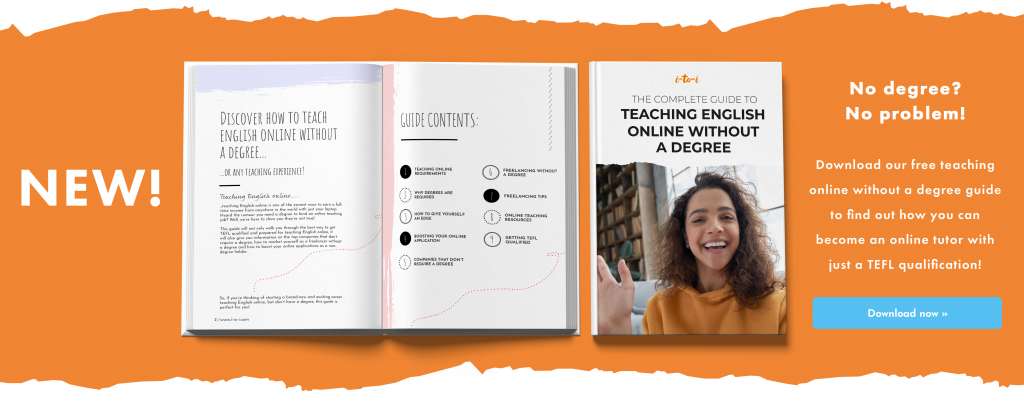If you’re considering becoming a TEFL teacher, one of the first things on your mind is probably “Which TEFL course is best?” Well, I’m here to help you answer that, so you can start your TEFL adventure as soon as possible.
A few years ago, I did a TEFL course with i-to-i and went on to do a lot of teaching and travelling overseas. It was one of the best experiences of my life! I was able to teach people of different ages, and backgrounds, and see the world. Now I enjoy helping others to begin their own adventures!
So, let’s get started!
What’s the difference between TEFL, TESOL, CELTA and DELTA?
You may have seen the acronyms TEFL, TESOL, CELTA, DELTA … And with that many, it can get a bit confusing! So, what’s the difference?
TEFL and TESOL are basically the same, TEFL means Teaching English as a Foreign Language and TESOL means Teaching English to Speakers of Other Languages – 2 ways of saying the same thing! Choosing one over the other for your qualification won’t really influence the teaching opportunities you can get. There are far more important aspects, such as the organisation that sells them, the content within the course, and the level of assessment.
CELTA stands for Certificate in English Language Teaching to Adults and, as it suggests, it only focuses on teaching English to adults (whereas TEFL qualifications cover all age groups). CELTA is a Level 5 qualification, which is the highest level of TEFL before you reach DELTA. This used to be the only qualification assessed at this level, but there are now organisations, like i-to-i, that provide a Level 5 TEFL qualification! The same level of assessment as the CELTA, without the hefty price tag and taxing time commitment (4-5 weeks full time in a classroom)!
DELTA stands for Diploma in Teaching English to Speakers of Other Languages, and this qualification is equivalent to a master’s degree. So, as you can imagine, it’s a serious commitment and only really necessary if you are looking to set up your own TEFL language school or teach new TEFL teachers. All of our Level 5 courses have been written by DELTA-qualified tutors, so you can benefit from their experience and knowledge, without having to go through a DELTA-level course yourself!
So, it’s a no-brainer, right? The Level 5 TEFL qualification is probably going to be the best one for your needs.
Why does accreditation and regulation matter?
Any good provider needs to be accredited. Accreditation is a stamp of quality that is put on your company by a third party. We are accredited by the ODLQC (Open & Distance Learning Quality Council) which ensures that we do what we are supposed to do! We are also now DEAC-approved, which means we’ve received recognition from the US government, as well as the UK.
Unlike many other companies out there, i-to-i’s qualifications are also regulated by Ofqual – the English government body that regulates secondary school and tertiary qualifications. Not only does this ensure the qualification is kept to a very high standard, and can be used internationally, it also means that you are given really good feedback by our tutors to help you become a good quality teacher.
What should I look for when I’m choosing a TEFL course provider?
If you’re investing in a qualification that will enable you to travel the world and get well-paid opportunities, the organisation you go with is really important. On top of accreditation and regulation, look at the qualification – what does it include? How will it help you? You should also look at reviews of the course, paying specific attention to the academic and customer support.
Where you get your qualification from carries weight in the jobs market. i-to-i was the first provider of the short TEFL course and we have been providing courses since 1994! We have over 210,000 TEFL graduates and our name is known internationally. As soon as employers see that certificate on their desk, they know the qualification is of a proven level and the teacher has been graded to a serious standard!
Should I choose a Level 3 or Level 5 course?
A Level 3 assessment is equivalent to an A-Level in the UK, or a matric in South Africa. Level 3 qualifications in the TEFL market are often done by people who want to join an internship or a volunteer programme. It’s more of a short course to get you overseas and gaining some experience. If you’re not a native English speaker, or you feel you may struggle with a Level 5 qualification, Level 3 may be for you.
Level 5 is the same level as a foundation degree and is more of a professional qualification. Level 5 opens the door to work with language centres and private schools, that offer better rates of pay, better benefits, and more security. If you’re considering Europe or the Middle East, Level 5 is expected as a minimum.
What is the difference between i-to-i’s Level 5 courses?
We have four different options for our Level 5 courses:
The 180-hour TEFL Certificate will train you up in all the basics and get you qualified to teach English. It includes teaching vocabulary, teaching grammar, understanding context and teaching different age groups – you can see a full module breakdown on the website.
The 300-hour Diploma includes an extra 120 hours of study completely dedicated to online teaching and teaching business English, so it’s best suited for those that want to access higher paying jobs and more adult students. It’s also good for online teaching.
The 420-hour Advanced Diploma is our ’employer-preferred’ course. It includes everything the previous courses cover, plus additional courses in teaching IELTS and teaching other subjects in English (Maths, Geography and Science). It opens the most doors and will qualify you for the highest salaries. It’s also great for those that want to teach online, as IELTS tutoring, and Business English, are often taught to adults via online platforms/employers.
Our 500-hour Advanced Diploma is the highest level we offer. It includes everything in the 420-hour, plus modules on Business Skills and Digital Marketing, perfect for those that are looking to Freelance as a TEFL teacher or if you eventually want to set up your own online TEFL school!
Why do TEFL courses have different numbers of hours?
The hours are the building blocks of the qualification, and they demonstrate to employers and students how much training you’ve completed. If you’ve completed more hours, it makes your qualification more competitive.
The hours are also an average of how long it should take you to complete your qualification. People do learn at varying paces though so, if you do the 180-hour TEFL course (which you’re given 6 months to complete) you might manage to complete it in 5-6 weeks, if you do it more full-time.
Which course is best for teaching online?
I would look at one of our Level 5 courses that includes the specific additional course in teaching English online, like the 300-hour diploma or the 420-hour advanced diploma, to make sure you get specific training in this teaching method.
If you’re new to online teaching and are looking for extra confidence, we also have a post-graduate course which is an online teaching practice session with a qualified tutor – done over Zoom.
Can I teach online with a 180-hour Level 5 TEFL course?
You can teach online with a Level 5 180-hour TEFL course but it doesn’t contain the specific online teaching training that the other Level 5 courses do, and you have to remember that you are entering into a competitive jobs market, so it’s best to make yourself as qualified as possible for the opportunities you’re applying to. Employers love to see that you have been trained to teach in their particular medium.
Can I teach English without a degree?
Of course! There are so many opportunities out there, including lots of online teaching jobs, for those without a degree. We’ve written another blog post about teaching online without a degree and we had a fantastic guest-written blog from one of our graduates, who told us all about her online TEFL teaching journey without a degree – so check them out for more info!
Our advisors can also talk you through the countries that do not require a degree for their work visa, so don’t hesitate to arrange a free call back with them.
Can I do Level 3 now and then Level 5 at a later stage?
Absolutely! If you want to do a Level 3 first and a Level 5 later, it’s completely up to you! It’s important for you to be aware, however, that you’ll have to start again with the Level 5. The Level 3 course is assessed at a completely different level, so if you then chose to do a Level 5, you would need to cover everything again, plus complete the additional study.
It’s a bit like doing a diploma and then deciding to do a degree. You can’t combine different diplomas together to create a degree, and the same applies to TEFL courses. So, please bear that in mind!
I would encourage you to speak to one of our advisors, so you can discuss what your goals are beforehand. We don’t want you to waste your money if the Level 3 won’t match what you’re looking for!
Which course is best for teaching business English?
Business English is the most lucrative market in TEFL. And remember, employers are looking for teachers who have been trained to teach business English, rather than someone who has had experience in the business world, although that always helps! The best course for teaching business English is our 420-hour Advanced Diploma, which includes a 60-hour Teaching Business English course.
We do also offer a standalone Level 3 Teaching Business English course, for those that already have a TEFL certificate and want to add it on, but this is assessed at Level 3, rather than the one as part of the 420-hour Advanced Diploma, which is assessed at Level 5. So, it may not look as competitive to an employer.
Do I need to speak a second language to teach abroad?
Not at all! If fact, when you’re teaching in a classroom, you’re actually told not to use the local language! Our TEFL courses train you how to teach effectively, using just English vocabulary.
I still remember when I did my TEFL course – for the first hour of the practical part, they didn’t speak English! They spoke Vietnamese to show me how it would feel to be a student. I didn’t know any Vietnamese but through receptive and productive activities, and core repetition, they were able to effectively teach me numbers. It was great!
How do I find a teaching job once I’ve finished the course?
We can help you there! We have a jobs board through our sister company, LoveTEFL jobs, which is constantly being updated with new jobs, and there are hundreds of jobs boards out there dedicated to niche jobs markets.
On top of that, if you are looking to teach overseas in a particular area – let’s say Phnom Penh in Cambodia – social media is great! There are TEFL Facebook groups that you can join where there are lots of job adverts and information about the local area, for example where expats hang out, and accommodation. It’s a really great way of finding out what the area is like and what opportunities are coming up!
What are the TEFL resource packs, and do I need them?
i-to-i’s resource packs are really helpful for feeling prepared for planning your classes, and ensuring you’ve got fun and engaging activities for your students! The Ultimate Resource pack has multiple guides and eBooks, for activities, grammar, lesson planning etc., to help you to design effective classes. They even have pre-written lesson plans for those of you who are a bit anxious about stepping into the classroom environment. If you wake up late one day and you have to teach a class in 10 minutes, it’s really good to have a pre-planned lesson!
Does my age matter for TEFL?
Not at all! Especially not if you’re teaching online! You also can certainly teach abroad if you’re older, but it’s important to note that there are some age caps for visas in certain countries. If you are over the age cap for that country, you won’t be able to get a work visa. There are ways around this though – you can travel and work online! Do the course, get qualified, and then, every time you set up camp, log on and teach online. You wouldn’t need a work visa to do that! You could use a holiday visa, as you’re travelling and seeing the country.
Can I TEFL if English is not my first language?
Some organisations specify that they are looking for native English speakers – maybe they’ve marketed their company as a language centre with native English speakers – however, you can always find opportunities for non-native English speakers to teach all around the world. There are also some great opportunities to teach online.
I hope that’s all been helpful! Remember, if you have any more questions, don’t hesitate to arrange a free call back with one of our expert TEFL advisors, they are always happy to help!
And I hope you enjoy your TEFL journey – I certainly did!
Want to hear more from Jordan? Then check out the recording of his live webinar (which this information is taken from) via the link below:





